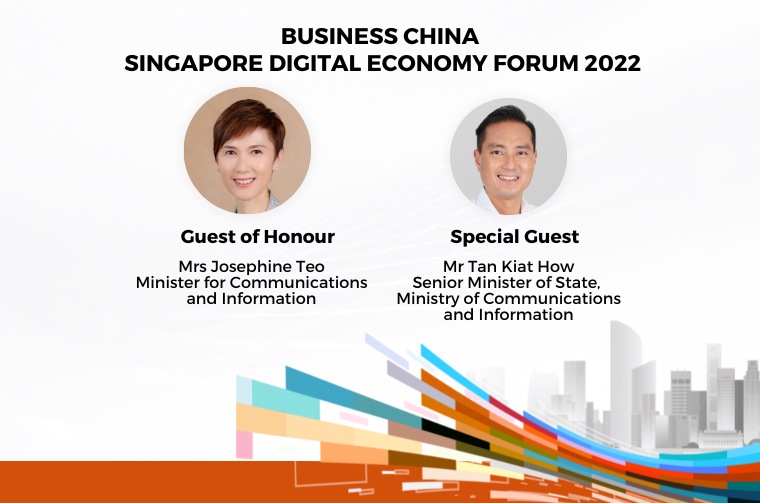On 23rd August 2022, Business China organised the Inaugural Singapore Digital Economy (SDE) Public Forum, featuring key stakeholders of Web 3.0 corporates, as well as distinguished officials of relevant regulatory bodies. The forum was conducted in a hybrid manner, and drew speakers and participants from around the globe.
The forum was aptly named “The Bridge between the Physical and Virtual Economy”, with the word “Bridge” symbolising the current state of digital economy development in Singapore, as we strive to strike a balance between the traditional economy and the new Web 3.0 digital economy.
Mrs Josephine Teo, Minister for Communications and Information, and Mr Tan Kiat How, Senior Minister-Of-State (SMS) for Communications and Information and National Development graced the public forum, which saw a total of 374 participants joining physically or virtually. Mr Lee Yi Shyan, Chairman of Business China, kickstarted the forum with a welcome remark, in which he emphasised the impact of Web 3.0, Artificial Intelligence, Blockchain and 5G on our lives and the society. Thus, the goal of the forum was to discover new economic opportunities around the world, seek ways to construct bridges from the present to the future, and provide a platform for various stakeholders to exchange views.
Minister Josephine Teo then delivered a keynote speech as the Guest-Of-Honour. She recounted the investments by venture firms in the Web 3.0 industry, and expressed her concerns about potential unlawful acts in the Metaverse due to the absence of Know-Your-Customers (KYC) measures. Minister Teo also mentioned various initiatives that Singapore was working on to better embrace Web 3.0 and Metaverse. This included boosting infrastructure for emerging technologies such as 5G and FinTech, investing more in research and development (R&D), and strengthening global collaborations.
In line with the theme, the forum explored the 3 types of “bridges” that were essential for the development of the digital economy.
Topic 1: The technological bridge
The first topic was on the technological bridge between traditional and online banking. Speaking at the Fireside Chat, Mr Bill Hughes, Senior Counsel and Director of Global Regulatory Matters of Consensys shared about obstacles hindering Web 2.0-based incumbents from embracing Web 3.0. He also noted the importance of consensus in Blockchain and its impact on transforming the partnership models between public and private sectors from top-down to parallel.
This was followed by three panel discussions on the topic.
Panel 1 – Sowing the Seeds of Web 3.0 Financial Products: CBDC, Stablecoins, Tokenisation
Moderator: Professor Emir (Head of FinTech Training of NUS Asian Institute of Digital Finance)
Panellists: Ms Eowyn Chen (CEO of Trust Wallet); Mr Will Lee (Founder of InterOpera); and Mr Liu Yusho (Co-founder & CEO of Coinhako)
The panellists spoke on the key factors affecting mass adoption of Web 3.0 from the consumers’ ethics perspective, such as assets security and data privacy. They shared that Decentralised Finance (DeFi), Central Bank Digital Currency (CBDC) and Stablecoins backed by actual assets were possible stable assets that could mitigate the risks from the volatility of other digital currencies.
Panel 2 – Virtually Unlimited: Innovation and Practices by Financial Institutions and Businesses
Moderator: Mr Lennon Tan (President of ADERA Global)
Panellists: Mr Wu Jihan (Co-founder of Matrixport); Mr Louis Liu Xi (Founder & CEO of FOMO Pay); and Mr Rajeev Tummala (Director of Digital & Data, Markets & Securities Services of HSBC)
The panellists noted that while hopping on the bandwagon early does reap benefits for traditional institutes, there were risks due to unfamiliarity of the technology. Thus it was essential to adopt a gradual approach such as accepting cryptocurrencies for a start, which would open the doors for introducing other blockchain-based, non-financial services to expand the user base.
Panel 3 – DeFining Future Banking Landscape with DeFi Innovations: Custodian & dApps
Moderator: Ms Shen Yue (Audience Strategy Editor of Lianhe Zaobao)
Panelists: Mr Li Wanli (Founder of DigiFT); Mr Martin Pickrodt (CEO of Marketnode); and Dr Jiang Changhao (Co-founder & CTO of Cobo)
The speakers saw the recent crypto winter as a stress test on DeFi. This in turn prompted traditional services to innovate and experiment. One such example was the custodian technology which has gone beyond simply storing private keys, to offer greater interaction with the Blockchain dApps.
Topic 2: The regulatory bridge
The forum then moved on to discuss the second topic of regulatory bridge between physical economy and Metaverse. The session was kickstarted by SMS Tan Kiat How who delivered a speech as the forum’s Special Guest.
SMS Tan noted the lack of formulated regulation of Web 3.0 in many countries today, and Singapore’s goal was to strike a balance between innovation and regulation through initiatives such as data protection policies and the recently launched technology sandbox. SMS Tan also emphasised the importance of enhancing global interconnectivity while building a digital world.
The second topic consisted of the following two panel discussions:
Panel 1 – Embracing a New Age of Finance: Regulating a Safer Economic Space for All
Moderator: Professor David Lee Kuo Chuen (Associate Professor of SUSS School of Business)
Panellists: Mr Sopnendu Mohanty (Chief FinTech Officer of Monetary Authority of Singapore (MAS)); and Mr Yuta Takanashi (Chief FinTech Officer of Financial Services Agency of Japan)
The speakers discussed the roles of Stablecoins and the transparency offered by Blockchain which would benefit the public. In addition, regulators must ensure that new digital assets created on Distributed Ledger Technology (DLT) platforms strictly comply the stipulated protocol.
Panel 2 – For a Better Future: Creating a Safer Web 3.0 Space
Moderator: Mr Sholi Goodman (Lawyer)
Panellists: Ms Katherine Ng (Managing Director of TZ APAC); Ms Mary Ma (Founder of MixMarvel); and Mr David Shin (Head of Global Adoption of Klatyn)
The panelists discussed the balance between anonymity in Web 3.0 and the necessity of KYC. The latter could complement social credit systems in the Metaverse to effectively regulate user behaviour. In the Metaverse, users’ voices are as important as that of founders and investors. This could curb illegal acts such as discrimination and privacy breach, and empower the community to draw up laws to define the boundaries of acceptable behaviours in the Metaverse.
Topic 3: The infrastructural bridge
The final topic of the forum touched on the infrastructural bridge between Web 2.0 and Web 3.0, In his speech, Dr Xiao Feng,Chairman of HashKey Group,recounted the evolution from Web 1.0 to Web 3.0, and the move towards decentralisation and permission-less systems, which enabled Blockchain, smart contracts, and other new technologies to thrive on the Internet ecosystem. He had also proposed strategies for Singapore’s digital economy development, such as building a new-generation capital market based on tokenisation.
This topic consisted of the following three panel discussions:
Panel 1 – Accelerating the Growth of Digital Economy: Collaboration between Web 2.0 Institutions and Web 3.0 Networks
Moderator: Mr Chia Hock Lai (Co-Chaiman (US & Europe) of Singapore Blockchain Association)
Panellists: Mr Zhang Weiwu (Co-founder & CTO of Smart Token Labs); Mr Andrew Vranjes (General Manager (APAC) of Blockdaemon); and Mr Deng Chao (Managing Director of HashKey)
The speakers felt that there were abundant opportunities for Web 2.0 to connect with Web 3.0. For example, the acceptance of tokens on existing platforms and NFTs, GameFi, tokenisation and other financial products that deal with cryptocurrency and Blockchain, could enable businesses to break through traditional boundaries.
Panel 2 – Up-teching: Reimagining Data Sharing with Web 3.0
Moderator: Ms Tan Bin Ru (Co-chairman (China & SEA) of Singapore Blockchain Association)
Panellists: Mr Usagi Liu (Co-founder of RSS3); and Mr Rudy Lu (Asian Partner of InfStones)
The speakers felt that rather than debate whether Web 2.0 or Web 3.0 would emerge as the winner, it was better to focus on the personal data privacy and ownership rights of individuals. Although Web 2.0 companies that profit from data collection might get affected, they could on the other hand, benefit from the greater data availability in Web 3.0.
Panel 3 – The Future of Digital Nation: Decentralised Identifiers (DID), Soulbound Tokens (SBT) and Non-fungible Tokens (NFT)
Moderator: Professor Wen Yonggang (Professor of NTU School of Computer Science and Engineering)
Panellists: Mr Suji Yan (Founder & CEO of Mask Network); Mr Sun Lilin (Founder of LatticeX Foundation); and Mr Raymond Yuan (Founder & Chairman of CTH Group)
The panellists believed that Decentralised Identifiers (DIDs) and Soulbound Tokens (SBTs) have the potential to be unaffected by any entity and could offer secured anonymity and data protection in Web 3.0. However, this does not mean middlemen entities will be eliminated as these entities could become service providers. In addition, privacy is dependent on information security rather than anonymity, and total privacy might not be necessarily positive.
In closing
The forum came to an end with the closing remark delivered by Ms Tin Pei Ling (CEO of Business China). She thanked the participants and speakers for making the event a success, and emphasised the importance of seizing the emerging opportunities from the Web 3.0 development. She urged participants to continue exploring ways to build a safe, inclusive and innovative Web 3.0 space.

